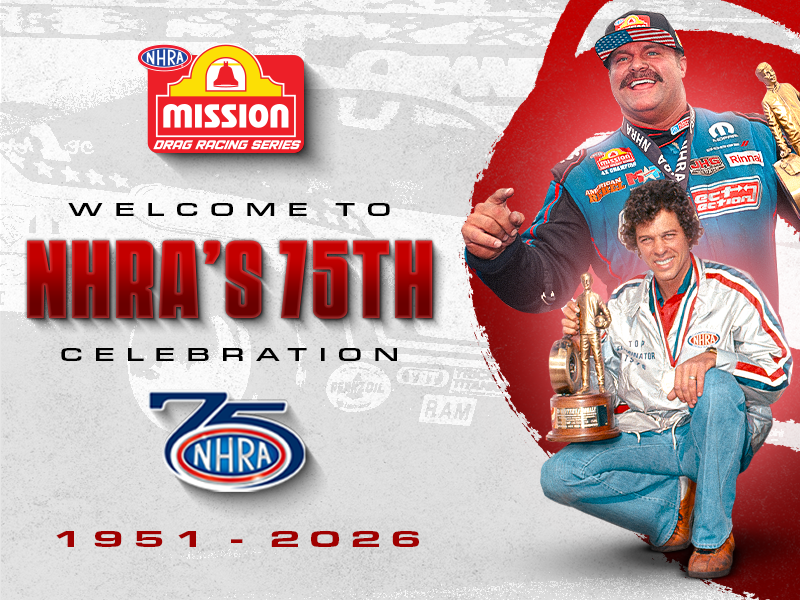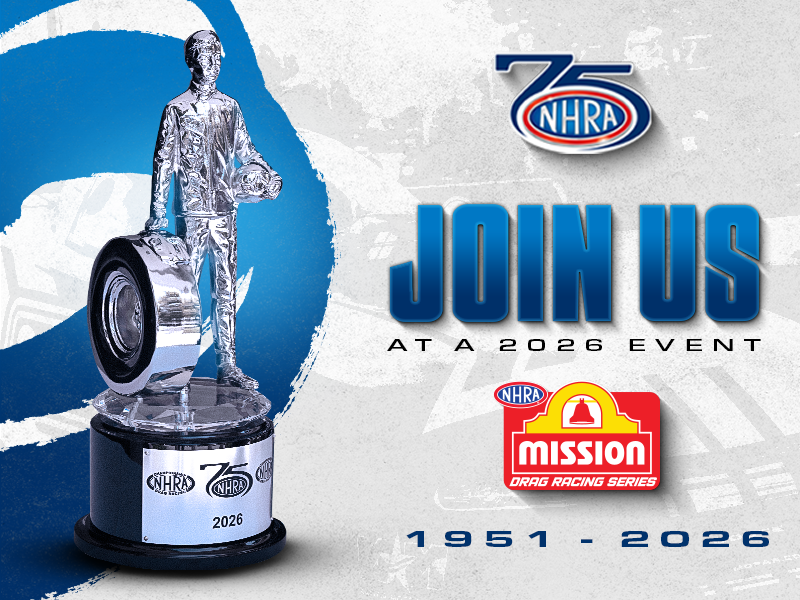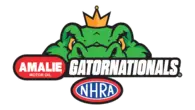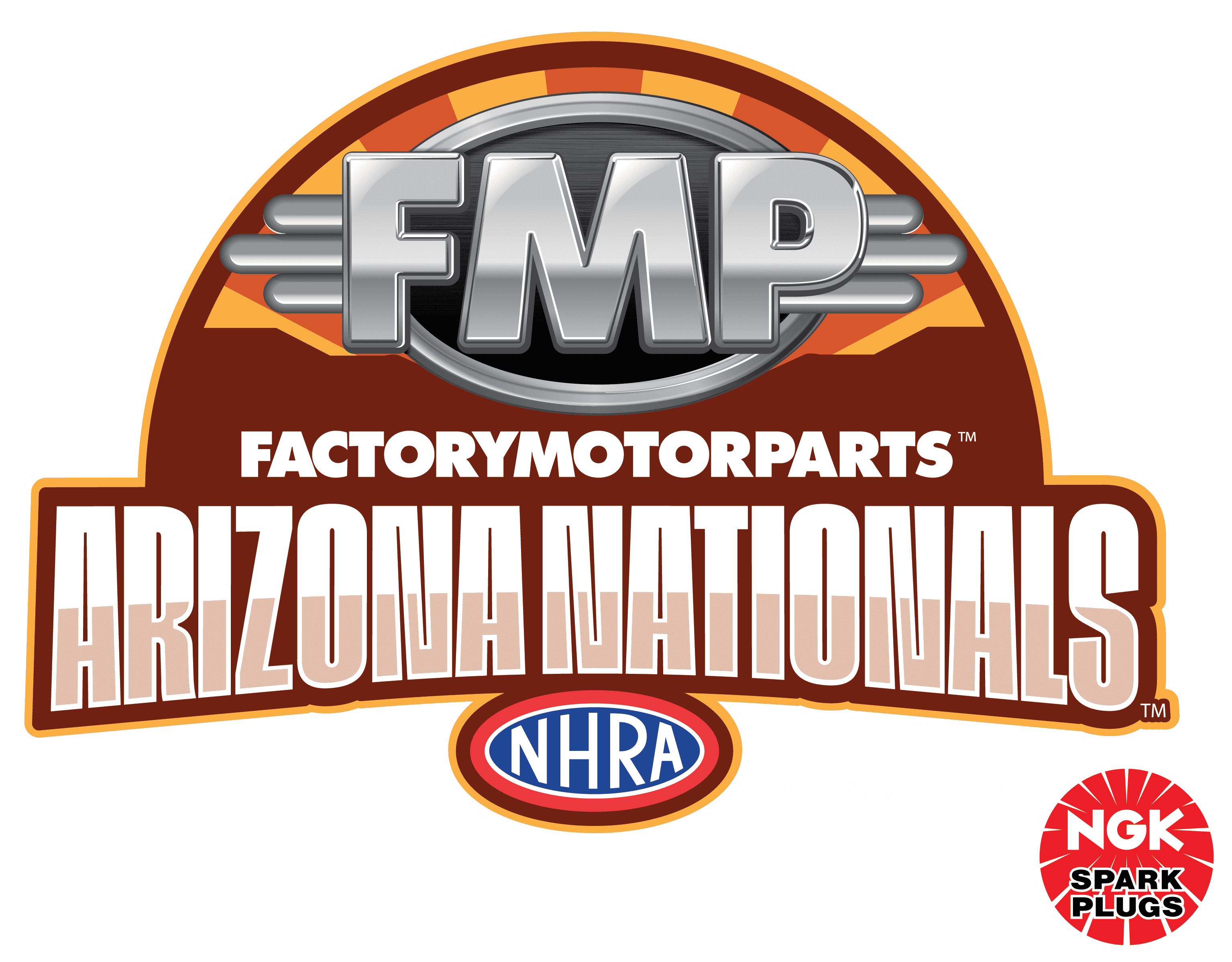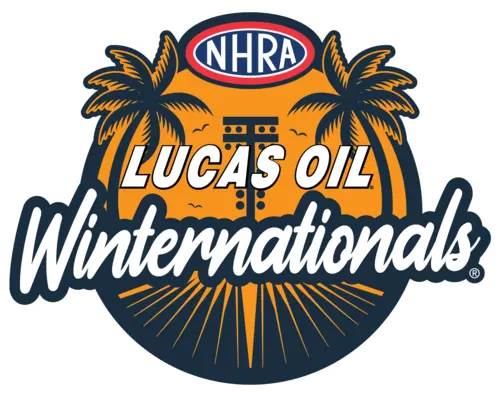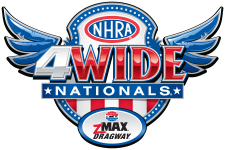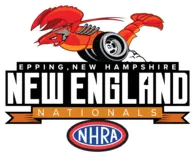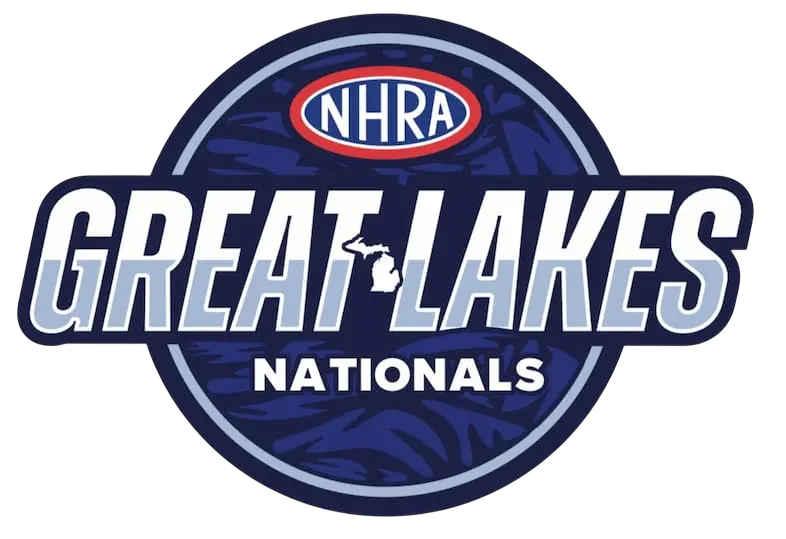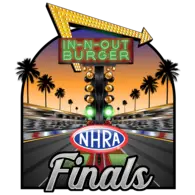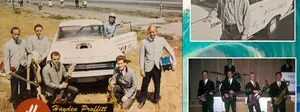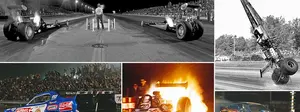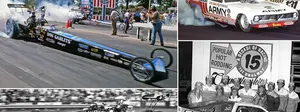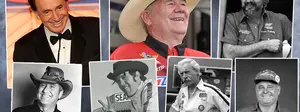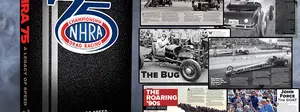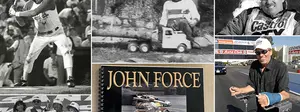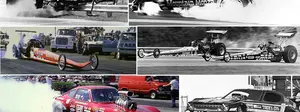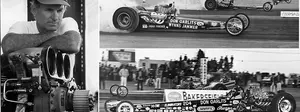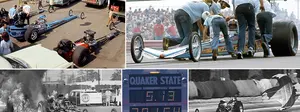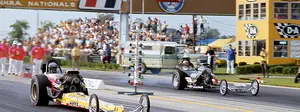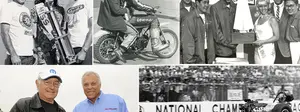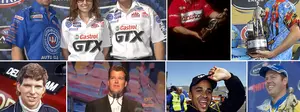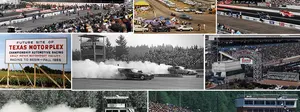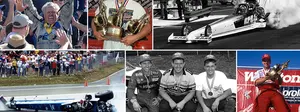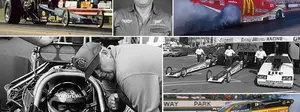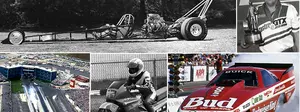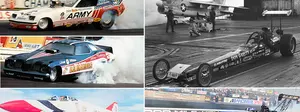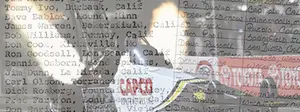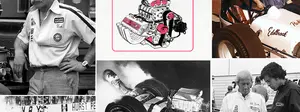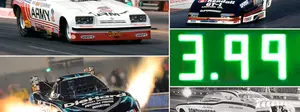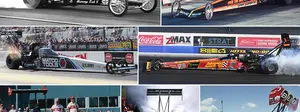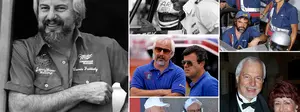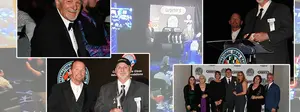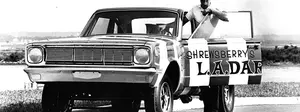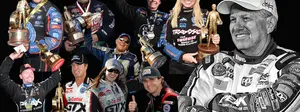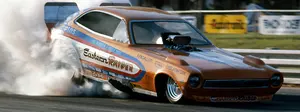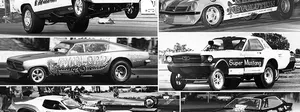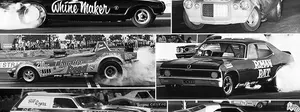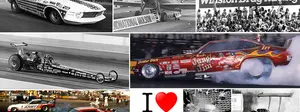Racer's Scrapbook: Jerry Ruth
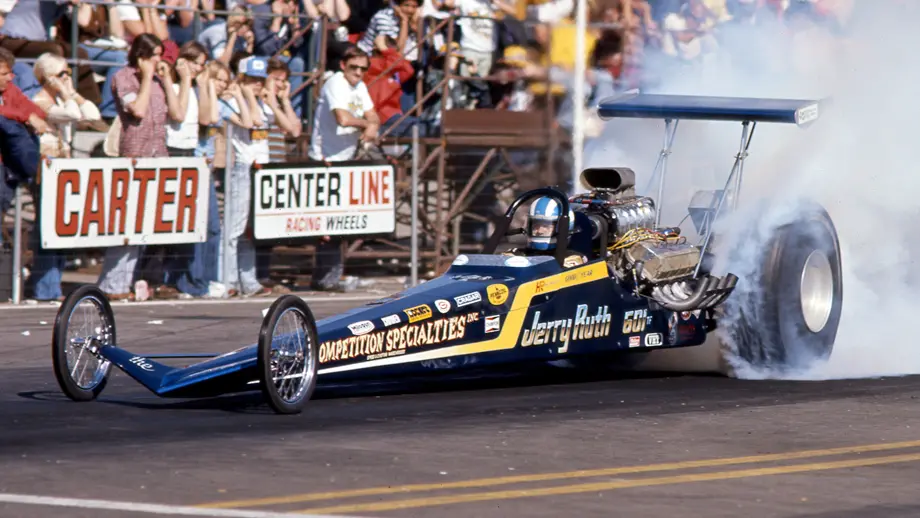
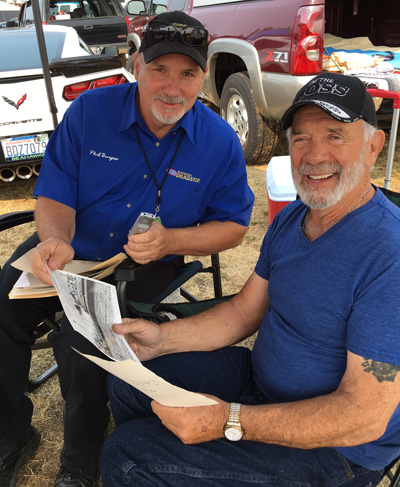 The chance to sit and talk with legends of drag racing is one of the real perks of my job, and for a kid who grew up following the sport from the other side of the printed page, it’s a dream come true to enjoy some one-on-one time with them. Due to geography, this usually happens over the phone, but at the recent NHRA Northwest Nationals in Seattle I got the royal chance to spend an hour or so chatting with “the King of the Northwest,” Jerry Ruth.
The chance to sit and talk with legends of drag racing is one of the real perks of my job, and for a kid who grew up following the sport from the other side of the printed page, it’s a dream come true to enjoy some one-on-one time with them. Due to geography, this usually happens over the phone, but at the recent NHRA Northwest Nationals in Seattle I got the royal chance to spend an hour or so chatting with “the King of the Northwest,” Jerry Ruth.
Ruth and I had spoken a couple of weeks ago when I called him to ask for some comments after the passing of his longtime pal, Frank Hall. When he told me he’d be in Seattle to cackle one of his cars and to drop by and see him, he’d didn’t have to ask twice. I got the bright idea to resurrect an old National Dragster feature from the 1980s, the Racer’s Scrapbook, for which we’d mail photocopies of some photographs (this was the 1980s, remember) from our library then call the racer up and go through them together. I decided that this would be even sweeter done in a live setting.
I thumbed through Ruth’s two-inch thick photo file, cherry-picked two dozen interesting images, and headed north, then pulled up a chair next to Ruth Saturday morning and went at it. Thanks to Ruth’s new bride, Cynthia, for shooting the photo.
Ruth may be closing in on 80, but he’s as sharp as he ever was, providing intricate detail to the photos I proffered. He was classic Jerry Ruth – funny, forthright, scholarly, unapologetically frank, humorously profane, and not afraid to pat himself on the back; in other words, he was everything I’d heard and hoped he would be.
Between signing scores of autographs for fans young and old, he shared his memories. Most of them were spot on, but some I’ve fact-corrected on the fly (I’ll never tell which ones). I hope you enjoy my audience with the King.
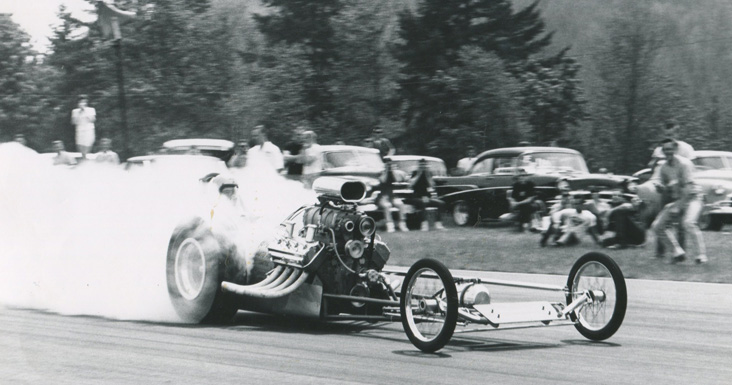
“This is one of my earliest dragsters, in 1964. I think this is at Arlington [Drag Strip, Washington]. Look at those weed sprayer headers. That tells me that it was early 1964. This is the old Adams & Stewart chassis; I bought it from Gene Adams and built the engine up there. It’s my first car with a Chrysler; I had two Chevy-engined cars before that but I got tired of getting my hands cut working inside the crankcase of the Chevy.”
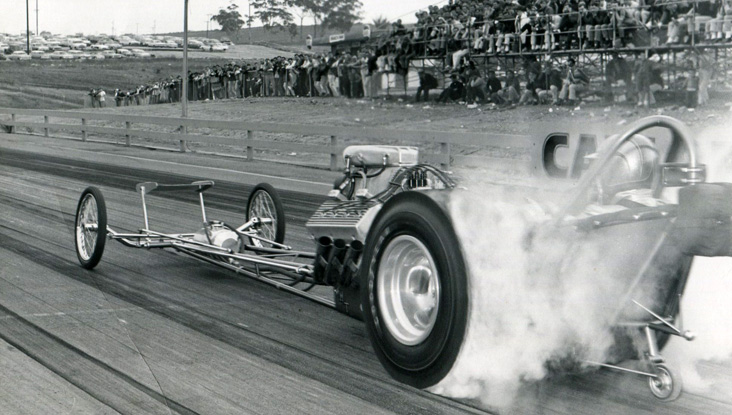
“This is 1965, at Carlsbad [Calif.]. It looks like the other car but I know it’s not because it has Enderle [injectors] on it and has a front wing. That’s a [Tom] Hanna wing. Wings were the first thing he sold. He teases me because he remembers me calling to buy the wing and bragging that I was kind of a hot dog up here.”
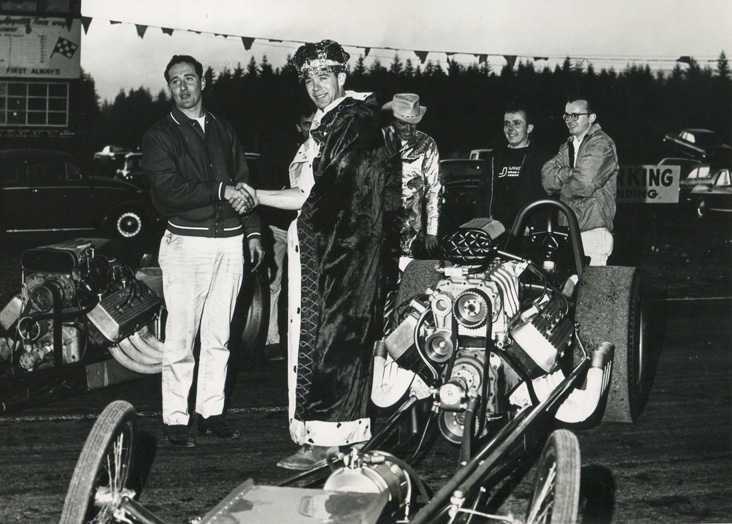
"Ah yes, this photo. Clark Marshall, who was the promoter, rented the cape and the crown. This is Puyallup, 1966; we were supposed to race against Sid [Waterman] and his car; Ronnie Hampshire was the driver. We never got a chance to run the race because it got so foggy we couldn’t even see the finish line. Behind my car is the Higgins brothers, who were the partners on that first Chrysler car; they’re both dead now.
“L.C. Taylor, who was a sports writer who wrote mostly for Drag Sport Illustrated, gave me ‘the King’ name in 1965. I can’t say I didn’t like the name: ‘King of the Northwest.’ When I won the [NHRA] world championship in 1973, I changed it to ‘King of the World.’ “
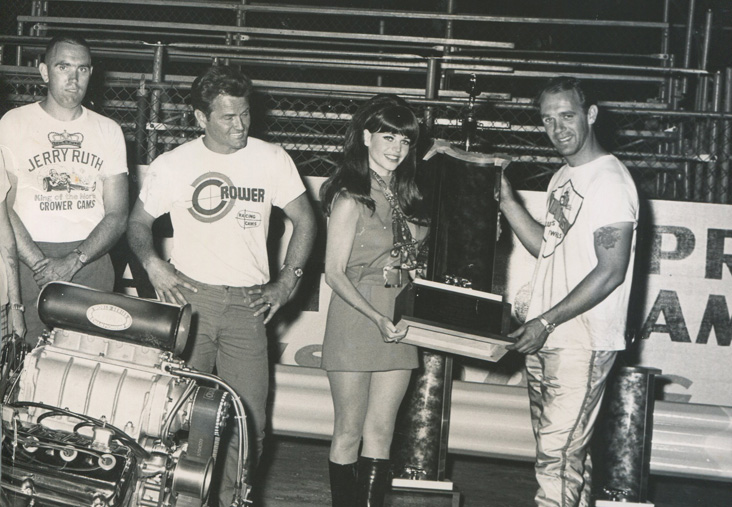
“That’s me with Frank Hall on the left and Charlie Reed in the winner’s circle somewhere, not sure where. Ol’ Charlie was a handsome devil. If you had a girl you wanted to keep, you didn’t introduce her to Charlie. Charlie would say [Southern drawl], ‘Muh pleasure, ma’am’ and it was all over.”
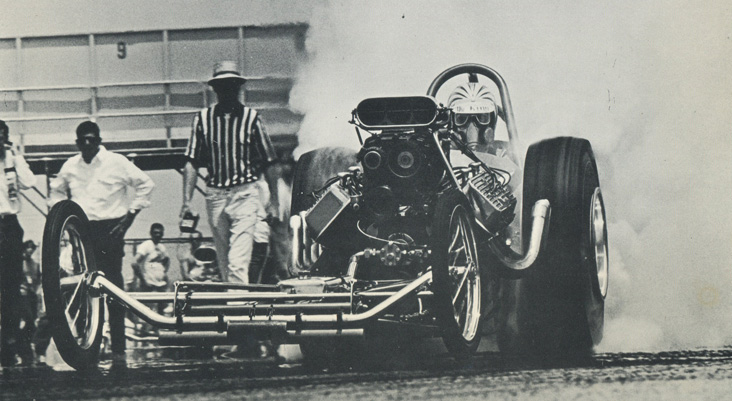
“Good ol’ Lions Drag Strip. This is probably ’66 or ‘67. It’s a Woody [Gilmore] car. You can tell because Woody cars only have one drag link. Look at the tire about to come off the wheel there. That looks dangerous to me. I ran a lot of California tracks – Ramona, Carlsbad, Vacaville, Raisin City, Orange County, Irwindale, you name it.”
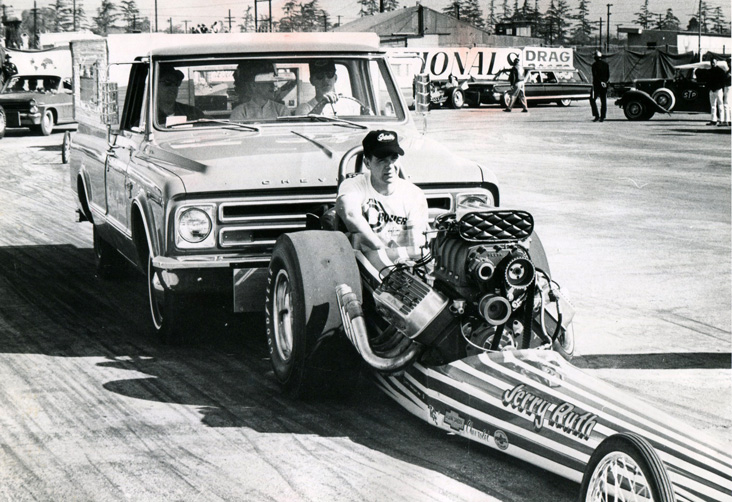
“Obviously the Winternationals. This would be 1967. My first full-bodied car; [Doug] Kruse did the body. We used to have a parade down the track of all of the qualifiers before eliminations. That’s my old Chevy truck with my buddy Jim Crooke driving. Man, look how young I look there. I would have been 29.”
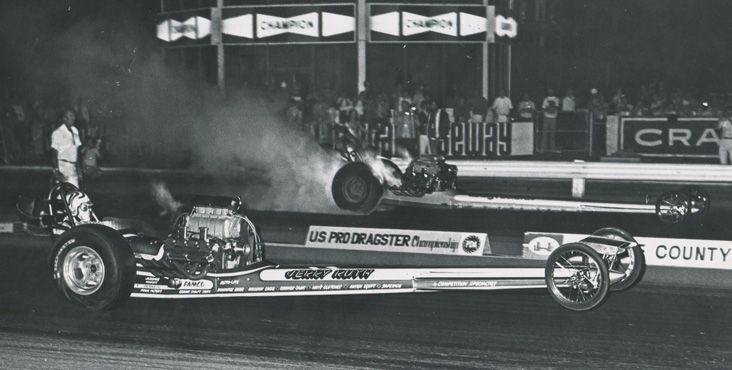
“This is 1969, Orange County [Int’l Raceway] at the U.S. Pro Dragster Championship race. When you see a car wheelstand like this, it means you’re trying to run it too light. Looks like it could have used another 15 pounds on the nose; 15 pounds wouldn’t have hurt the e.t. I remember John Stewart was having wheelstand problems one year, and thought he had too much clutch; I told him, don’t [mess] with the clutch. The car is trying to run good; just hang some weight on it.”
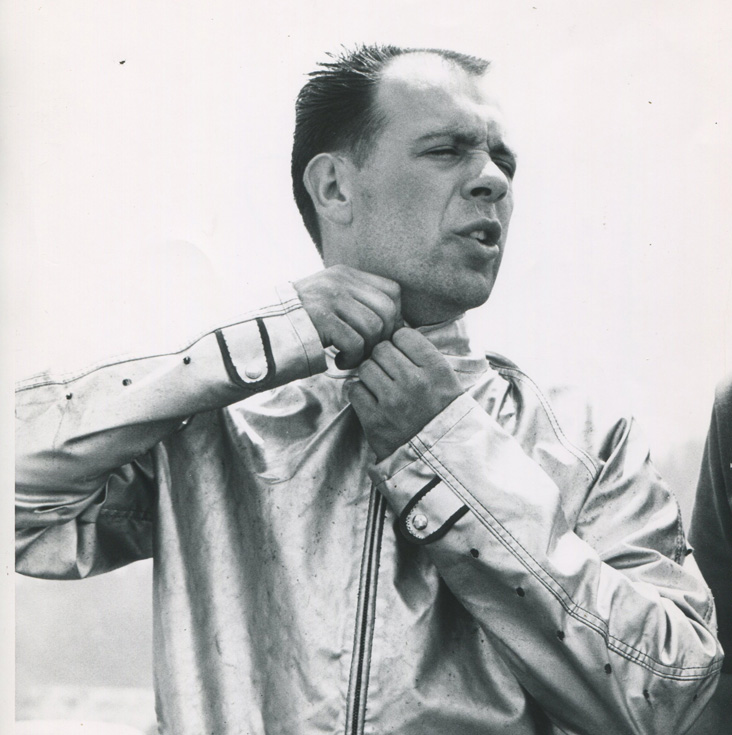
“How about those old firesuits we used to wear? You know what that material was? That was the stuff they used to cover ironing boards with. It gave you about as much fire protection as the ironing board got when you were ironing on it.”

“The car is hauling ass here. Looks like 1970 at Sears Point. You can see the tires are still smoking a little bit, because that’s what we needed to do at the time. The tires had to be shearing rubber to go fast. When the tire shears, the kickback has a bunch of power stored in the tire, like a rubberband. Goodyear tires were the best at doing that. I did a lot of tire testing for Goodyear so I learned a lot about how tires work.”
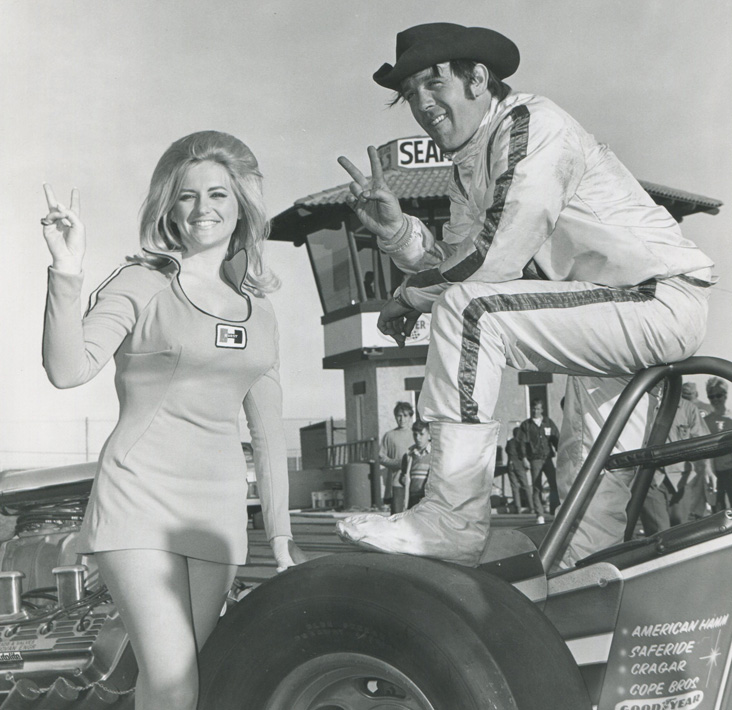
“This is after I won that race at Sears Point. Me and Linda [Vaughn]. I talked to her the other day; she’s been in the hospital. I hope she gets well soon. Man, look at that chin. Mine, not hers.”
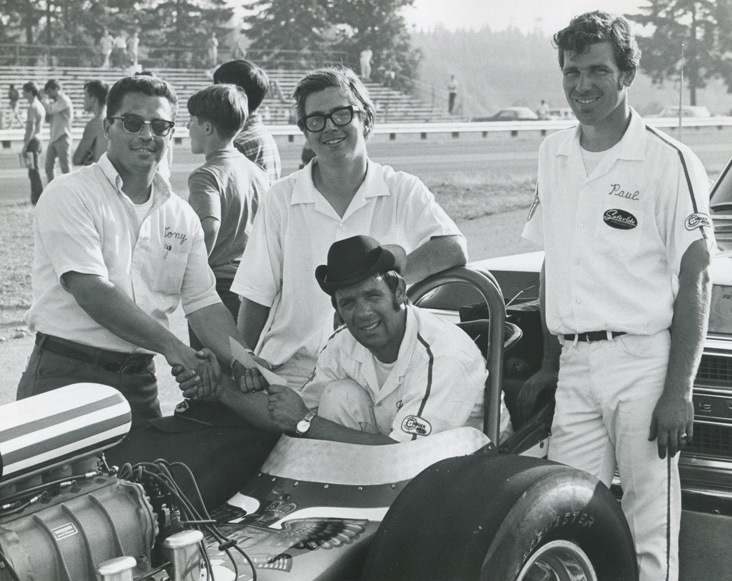
“That’s me, [with, from right] Paul Parkie, Jim Crooke again, and Tony Lamonte. Lamonte was in charge of the Travel-Ons race team that put on the Governor’s race at Arlington every year. I won it three or four times in a row. Jim used to own the Assassin dragster -- had a Ford cammer in it; he’s still a friend. I still have that hat.”
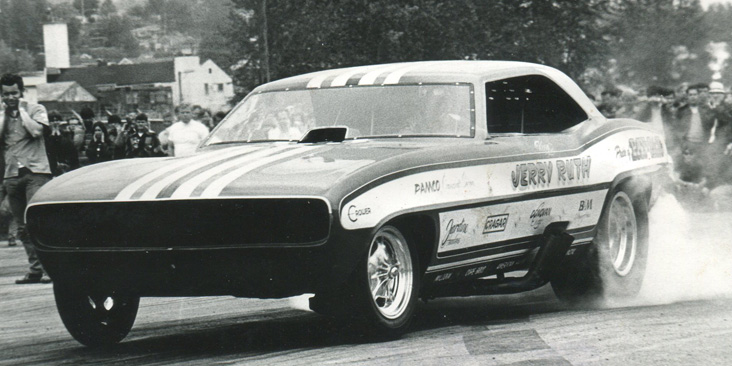
“This is my first Funny Car; it was a [Dick] Fletcher car that I bought from Whipple & McCulloch. It had a Chevy in it but I put a Chrysler in it, one of the engines out of my dragster. It’s also the first car that Frank Hall drove for me. It had a [Torqueflite] 727 transmission in it, but they burned up three transmissions the first week. I walked in the shop and it smelled like someone had burned bacon. I told them to throw the things away and make it high-gear-only. They changed it over, drove 550 miles to Boise, Idaho, and won the race.
“I was a dragster guy, but Funny Cars were in big demand. I made my living at this, and it could be a good living, I made $255,000 one year in the ‘70s. That was a lot of money back then.”
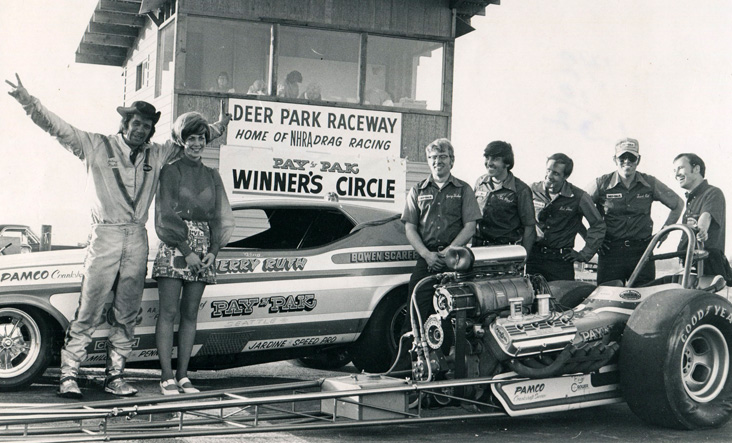
“I won a bunch of races running in both Top Fuel and Funny Car at the same race. This is Deer Park, in 1971, at the points meet. This is the car that I cackle now. It had the 426 then; the Funny Car still had a 392. We went an entire season without taking the engine apart. We’d take the pan off, check the bearings, and put the pan back on. There’s Frank Hall again [second from right] and that’s Jerry Verhuel [center]. That’s [Division 6 Director] Bruce Bowler on the end, and Art Shaw and Mike Chysyk. I think all these guys have passed on. Except me, of course.” [Note: Bruce Bowler is alive and well.]
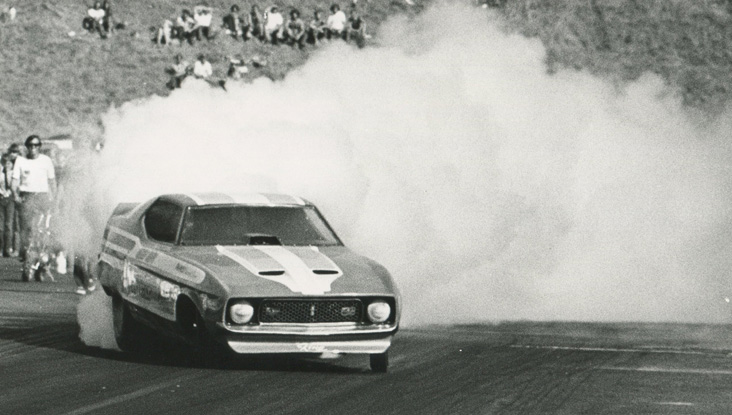
“People asked me if a Funny Car was harder to drive than a dragster. Not for me. They were both the same. I’m a natural driver. It’s been my great calling. People asked me which car I liked best. That's an easy answer: whichever one could win.”
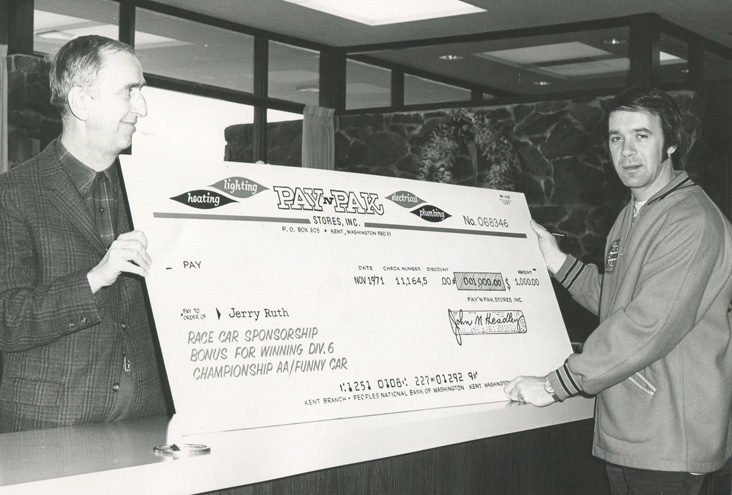
“Pay ‘n’ Pak was the sponsor of my dragster and Funny Car for a long time, probably eight or nine years. They were Lowe’s before Lowe’s – hardware, plumbing, electrical, and even auto parts. The first deal I ever got from them was just a quarterly deal. The next year they said they would match whatever prize money I won. Best season I ever had. That was the year I made $255,000. This is a bonus check I got for winning the Division 6 Funny Car championship in 1971. I look a little bit like Sonny Bono there.”
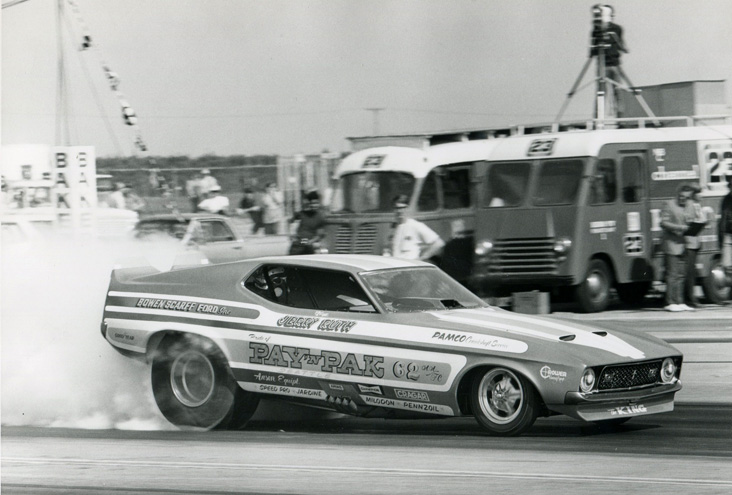
“This is my first Mach I. I loved the way those cars looked. It was only 52 inches high from the ground to the top of the roof. This is Bakersfield, the March Meet. I never won that race; got to the final a couple of times in the dragster but never won it. Never won Indy, either. Got to the Top Fuel final in ’72 but lost to Beck. The car was running great, low e.t. of every round, then we smoked the tires in the final.”
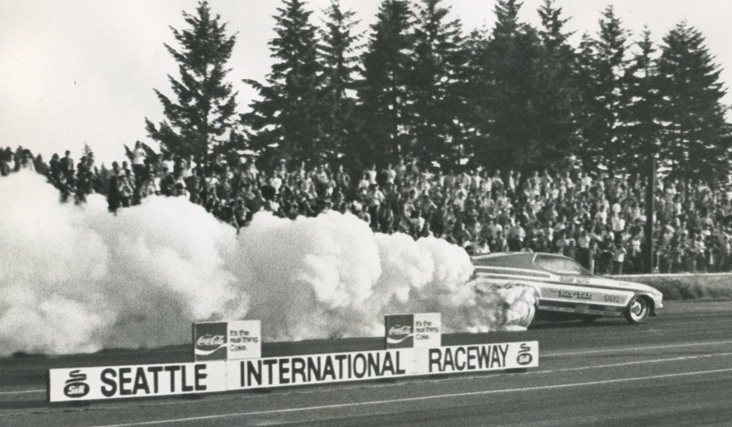
“This is right here [Seattle]. The fans all loved these long burnouts but it was really hard on tires. It would actually change the contour of the tire. It takes the center right off of it. People liked to see them and they were fun to do, but it’s not what makes you win.”
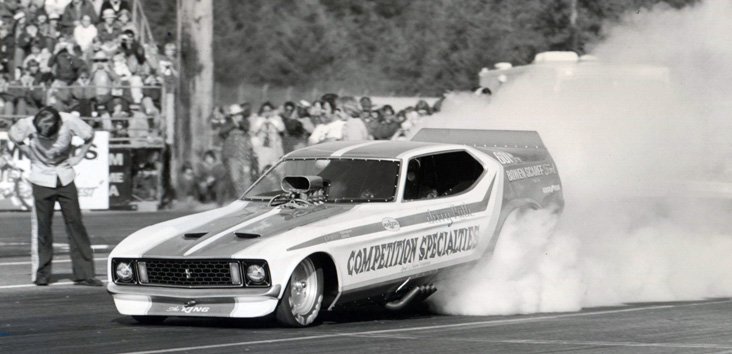
“I think this is the car that I sold to Rodney Flournoy, but I’m not sure. I had four of these; lost one in a crash Portland. Lyle Canham crashed into me from behind in the shutdown area. The motor in his car sat real high and he had a hard time seeing where he was going. It was like the car exploded behind me. It drove parts right through my seat and into my back; I still have the scars. I didn’t know what happened. I woke up on a hospital gurney being rushed down the hall. It was a nightmare. Someone was running next to me saying, “I’m sorry, Jerry. I’m sorry, Jerry.’ I just said ‘Get the [heck] away from me.’ ”
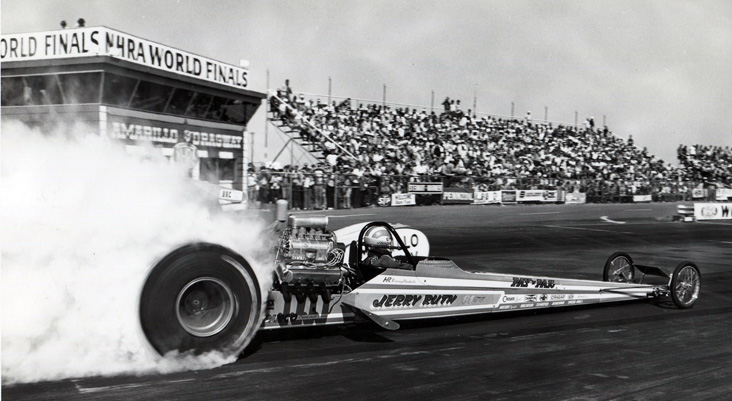
“This was a good day, Amarillo 1972. Won the world championship. Beat Gary Beck in the final. In those days you won the championship by winning the race, but you had to win the division or finish second to get invited to the race. I have a video of the race because it was televised. Dave McClelland started out by calling me ‘the self-proclaimed King’ and after I won it all he just called me ‘the King.’ "
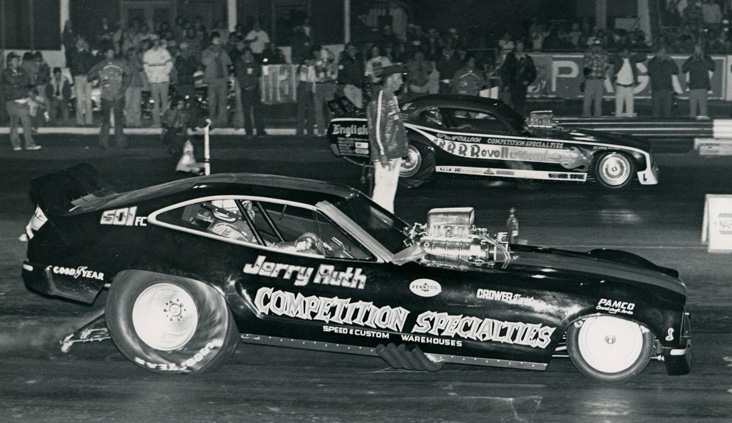
“This was my last Funny Car, a Mustang II, that I ran in 1977 I had Lee Beard drive it with my name on it for a while –- he paid me 10 percent of what he earned – and he later bought it from me. I won Pomona that year [1977] in Top Fuel so I got a lot of bookings. I would spend $500 in phone bills -- a lot of money back then – each January booking my own dates for the year.”
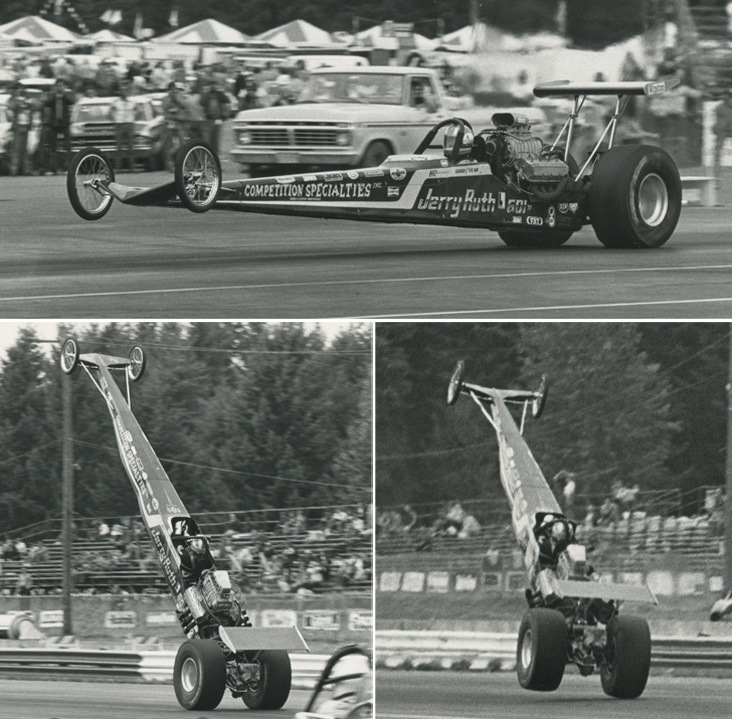
“[1977 Fallnationals in Seattle] I’ve never seen these photos. These are incredible. Look at that; it’s only got one rear tire on the ground. Looks like I had to much gear in it; it was a quick-change rear end, and you could change ratios with the flick of a finger. I guess I was changing things I shouldn’t have been changing. I remember it actually going past center; I’m not sure how it came back down. I remember it landed hard and knocked both front tires off it and bent it up a bit but we got it fixed and ran the next day. ” [You can see the hard landing in Al Kean's great photo here; scroll all the way to the bottom.]
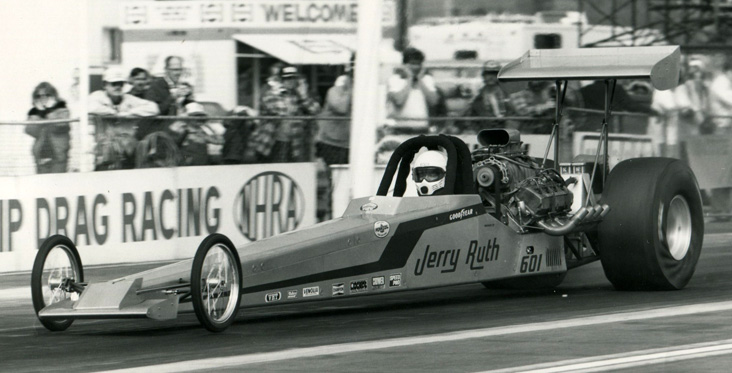
“This is the car that changed all of drag racing. 1980. A lot of people think that Al [Swindahl] designed it, but he didn’t. I designed it. There was a reason for every tube, and every tube thickness on it. The year before, I got knocked out by tire shake in Indy because I hit my head on the cage – it broke my arm and ripped a finger off when I crashed off the end of the track-- so I designed this car using a shoulder hoop off of a Funny Car for the rollcage. People told me it looked like crap, that it was ugly; I didn’t care. I needed to fix this thing or my career was over. I wanted to have Don Long build it because he was my guy, but it was going to cost a lot of money. If he could have done that for me, he’d probably still be building chassis. I would have made him rich. I made Al rich and helped him realize his dream of the lifetime, to build a car for the big guns.”
“People might have called it ugly, but they never called it slow. I won the Mile-High Nationals with this car, and was the first car in the fives up there. I beat [Gary] Beck in the final. Before long, everyone wanted a Swindahl car. I eventually sold it to Richard Holcomb, and he made it the third car to run in the fours.”
That 1980 Denver win was the last NHRA victory of Ruth's career, and he retired after the 1984 season, but left behind an incredible legacy of performance and innovation. People think of places like Southern California or Texas being the hotbed of Top Fuel, but being "King of the Northwest" was no easy feat racing guys like Herm Petersen, Gary Beck, Hank Johnson, Gaines Markley, Rob Bruins, and Graham Light every week, I think he's earned that crown.
Thanks, Jerry, for taking us along on your ride down Memory Lane. You’re still The King.
Phil Burgess can be contacted at pburgess@nhra.com



